Readings Newsletter
Become a Readings Member to make your shopping experience even easier.
Sign in or sign up for free!
You’re not far away from qualifying for FREE standard shipping within Australia
You’ve qualified for FREE standard shipping within Australia
The cart is loading…






Published in 1999, this work examines the crucial role played by unofficial and underground activities in the transitional economies of Central and Eastern Europe and new independent states. Countries undergoing radical transformations from socialism to capitalism experience fundamental changes in institutional rules governing property rights, government regulations, taxation and the appropriate conduct of public service. Underground and unofficial activities represents non-compliant economic behaviours involving evasion, avoidance, circumvention, abuse and/or corruption of the institutional rules as well as efforts to conceal these illicit behaviours from the view of public authorities. The book employs the conceptual framework of the new institutional economics to elaborate the theoretical relationship between underground activities and overall performance of transition economies. The social, cultural and economic causes of unofficial activities are examined as well as their consequences for economic policy and performance. Policy issues include the relationship between tax evasion and corruption, the underground economy and organized crime, state and regulation, and methods and consequences of legalization of the underground economy.
$9.00 standard shipping within Australia
FREE standard shipping within Australia for orders over $100.00
Express & International shipping calculated at checkout
Stock availability can be subject to change without notice. We recommend calling the shop or contacting our online team to check availability of low stock items. Please see our Shopping Online page for more details.
Published in 1999, this work examines the crucial role played by unofficial and underground activities in the transitional economies of Central and Eastern Europe and new independent states. Countries undergoing radical transformations from socialism to capitalism experience fundamental changes in institutional rules governing property rights, government regulations, taxation and the appropriate conduct of public service. Underground and unofficial activities represents non-compliant economic behaviours involving evasion, avoidance, circumvention, abuse and/or corruption of the institutional rules as well as efforts to conceal these illicit behaviours from the view of public authorities. The book employs the conceptual framework of the new institutional economics to elaborate the theoretical relationship between underground activities and overall performance of transition economies. The social, cultural and economic causes of unofficial activities are examined as well as their consequences for economic policy and performance. Policy issues include the relationship between tax evasion and corruption, the underground economy and organized crime, state and regulation, and methods and consequences of legalization of the underground economy.